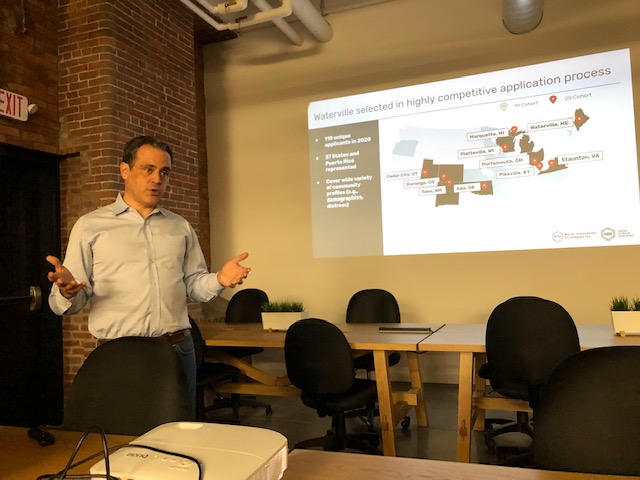WATERVILLE — An ongoing effort by the Central Maine Growth Council to create digital economy jobs is getting a major boost from a national technical assistance program.
Rural Innovation Strategies Inc. announced earlier this month that the Growth Council, a public-private economic development organization that serves Waterville, Winslow, Oakland and Fairfield, was among only 10 entities in the United States, and the only one in New England, to be chosen to take part in the 2020 Rural Innovation Initiative program.
The initiative is possible through a cooperative agreement between Rural Innovation and the U.S. Economic Development Administration. The program supports rural communities working to create digital economy jobs with an innovative hub strategy. The Siegel Family Endowment and Walmart also provide funds for the initiative.
As part of the program, the Growth Council and community will get help applying for a $750,000 grant from the Economic Development Administration that requires a 1-to-1 match.
Rural Innovation also will provide on-site and video conference time with its staff, assistance in executing an innovative hub strategy, help devising an economic development model that helps educate and train residents in digital skills, and help to empower people to launch startups that will drive the digital economy.
Digital economy jobs includes those related to activities, such as coding, software development, geographic design involving technology and advanced manufacturing.
The Growth Council also will get help in identifying and preparing for other funding sources, refining its economic development strategies, identifying partnerships and leveraging resources.
To that purpose, about 40 people, including entrepreneurs, educators, business owners and those involved in the creative economy, turned out Wednesday evening at Bricks Coworking & Innovation Space in the Hathaway Creative Center at 10 Water St. to generate ideas and collect input from the public on the initiative.
Central Maine Growth Council hosted the event in conjunction with Matt Dunne, executive director of Rural Innovation Strategies Inc. and founder of the Center on Rural Innovation, which partners with Rural Innovation Strategies. His company is located in Hartland, Vermont.
Last year, the Rural Innovation Initiative worked with nine communities and spurred $5.3 million in new investment in rural innovation hubs. This year, more than 110 communities from 37 states and Puerto Rico applied for the program.
Dunne said it was a very competitive process and it is no accident that Waterville was chosen.
“What made Waterville stand out is the leadership here and the college, both taking on the issue of creating jobs for the future,” he said. “We really think that there’s the right alignment of local leadership, institutions of higher education ready to collaborate and a can-do spirit.”
The Economic Development Agency asked Rural Innovation to work with smaller communities that have traditionally not applied for the EDA grant, known as the i6 challenge grant, according to Dunne. The grant is specifically geared toward supporting the growth of entrepreneurship in a region, he said.
While Rural Innovation does not apply for the grant or decide who gets it — the Growth Council would be the applicant — it provides feedback and a space for community leaders to convene and think through its plans.
Garvan Donegan, director of planning and economic development for the Growth Council, said the Rural Innovation initiative model for building a digital economy ecosystem strongly aligns with current and planned investments for downtown Waterville and the mid-Maine region.
“In addition to the i6, this helps us create conditions to prepare us for other federal funding opportunities, within EDA and other federal departments,” he said.
Rural Innovation also connects the communities taking part in the program so they can have joint video conferences, share experiences and talk about what works and what doesn’t.
The communities chosen to take part in the program had to be in designated rural counties according to the U.S. Census definitions or groups of rural communities in close geographic proximity to one another. Successful communities must have high speed broadband, available real estate or a significant part of the community located in Opportunity Zones and/or New Market Tax Credit census tracts, a relationship with a four-year endowed residential college or university campus willing to partner in the effort, and a nonprofit organization prepared to lead the effort.
Colby College has invested millions of dollars in Waterville’s downtown as part of a college-city partnership. Brian Clark, vice president for planning at Colby, attended Wednesday’s event.
The other nine communities chosen to take part in the program this year are in Oklahoma, Utah, Colorado, Michigan, Kentucky, Wisconsin, Ohio, Virginia and New Mexico.
Dunne told the group Wednesday that after the recession, there was a massive division based on place that occurred in the U.S. in which the recovery was fundamentally different between rural and urban areas. Urban areas were able to recover more quickly than rural areas, he said.
The rural population dropped between 2011 and 2016 and a much higher population of college graduates left rural areas, he said. College graduates with debt were much more likely to move to cities than rural graduates without debt, according to Dunne. He noted that that occurred even if the cost of living in the city meant they were not really getting ahead.
Three things that drove the lack of economic recovery were the automation of traditionally rural jobs, globalization and the rates of entrepreneurship, he said. Entrepreneurship was declining faster in rural areas than in urban.
Kristina Cannon, executive director of Main Street Skowhegan, told the group Wednesday she had seen a presentation on rural initiatives in Bangor.
“I’m really excited that Central Maine Growth Council pursued this opportunity,” she said.
Send questions/comments to the editors.




Comments are no longer available on this story